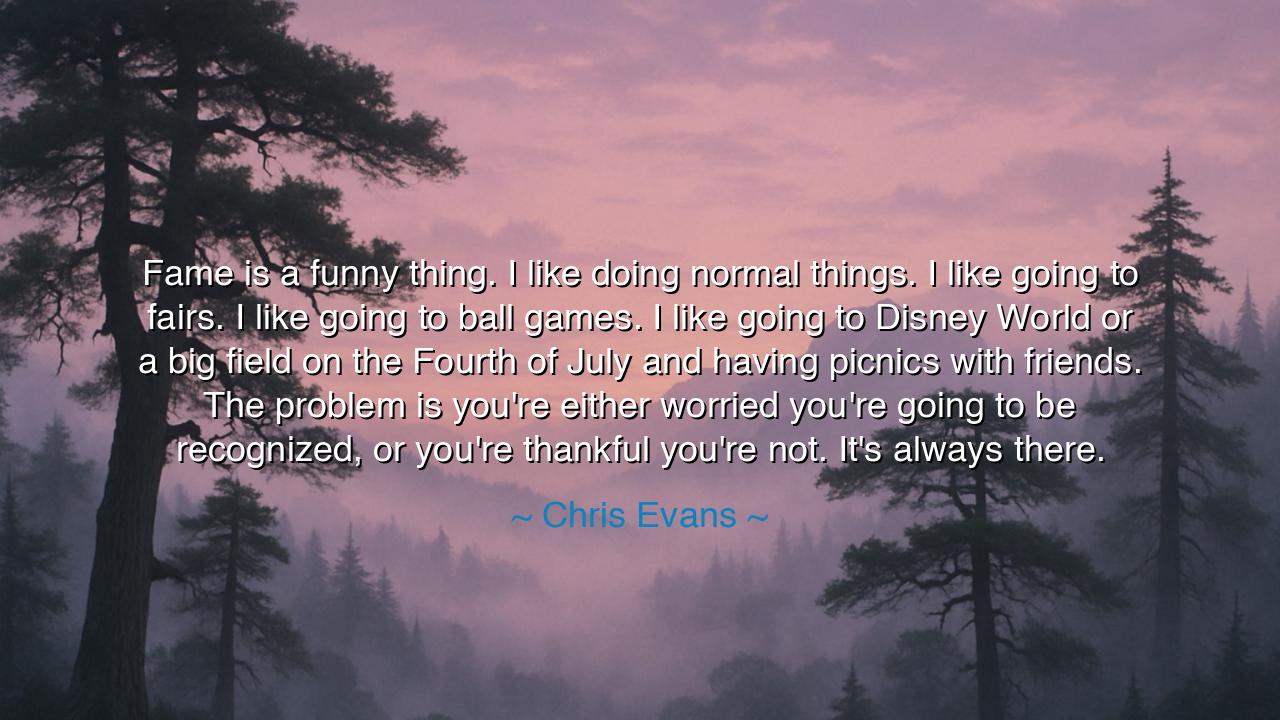
Fame is a funny thing. I like doing normal things. I like going
Fame is a funny thing. I like doing normal things. I like going to fairs. I like going to ball games. I like going to Disney World or a big field on the Fourth of July and having picnics with friends. The problem is you're either worried you're going to be recognized, or you're thankful you're not. It's always there.






When Chris Evans said, “Fame is a funny thing. I like doing normal things. I like going to fairs. I like going to ball games. I like going to Disney World or a big field on the Fourth of July and having picnics with friends. The problem is you're either worried you're going to be recognized, or you're thankful you're not. It's always there,” he spoke not as a star of cinema, but as a man longing for simplicity in a world that has turned his face into a symbol. His words carry the soft ache of one who has touched the golden fruit of fame and found it both sweet and heavy. To call fame “funny” is not to laugh at it, but to recognize its strange duality — that it gives what it also takes away, that it makes the ordinary precious by making it rare.
The origin of his reflection lies in the contrast between Evans’s public image and his private spirit. To the world, he is Captain America — the embodiment of heroism, leadership, and virtue. Yet behind that mighty shield stands a man who yearns for fairs, picnics, and the laughter of friends under a summer sky. In this confession, he speaks the truth known to all who have been elevated above the crowd: that fame, for all its glory, creates distance. The normal joys of life — the taste of a hot dog at a ballpark, the thrill of anonymity in a crowd — become fragile treasures. He must either guard them or mourn their absence. The world sees him as larger than life, but he, like all souls, wishes only to live freely among others.
In this, Evans joins a long line of artists and leaders who have discovered that recognition is both a blessing and a burden. The ancient poet Ovid, exiled from Rome at the height of his fame, once wrote that he wished he could return to obscurity, for in obscurity there is peace. The philosopher Seneca warned that public admiration is a chain of gold — beautiful, but still a chain. Even kings, wrapped in finery, have looked with envy upon the shepherd in his field, whose laughter is unguarded and whose rest is untroubled. So too does Evans reveal this paradox: that the one whom the world adores must learn to hide to find peace, while those who are unseen chase visibility as if it were salvation.
To say that fame “is always there” is to name its haunting quality. It follows, invisible yet constant, like a shadow that does not fade even when night falls. There is no true escape from the gaze of others once it has settled upon you. Even in solitude, the famous man wonders whether his silence will be noticed, whether his absence will be discussed. He cannot fully return to the world of the unknown. And yet, within this tension lies a deeper beauty: the reminder that fame does not erase humanity — it only magnifies its longing. Evans’s yearning for fairs, picnics, and friendship is proof that the human heart, no matter how celebrated, still hungers for the simple and the real.
There is wisdom in his humility. He does not curse fame; he calls it funny. He does not despise the adoration of others; he simply recognizes its cost. The laughter of the crowd cannot replace the laughter shared between friends. The flash of a camera cannot warm the heart as the sun does at a picnic. In his reflection, Evans shows the mark of the balanced soul — one who has learned gratitude without blindness, who can enjoy his fortune while still mourning what it has taken. His words remind us that even the most admired among us are not gods, but men and women who carry invisible burdens behind their smiles.
Consider also the life of Princess Diana, whose every movement was followed by the eyes of the world. She was adored, yet imprisoned by that very love. She spoke often of the loneliness of being watched, of the hunger for normalcy that fame had stolen. She too wished, as Evans does, for simple things — the sound of children’s laughter, the feeling of walking unrecognized among strangers. Her story, both luminous and tragic, reveals what Evans calls “funny”: that fame promises connection but often delivers isolation. The world celebrates your image while forgetting your soul.
So, my children, let this truth settle deeply in your hearts: seek not the glare of fame, but the glow of fulfillment. The applause of others fades swiftly, but the quiet joys of a shared meal, an honest conversation, a simple day in the sun — these are eternal. If destiny grants you recognition, carry it as a cloak, not as your skin. Remember that your worth lies not in how many know your name, but in how well you live your days. Do not measure greatness by visibility, but by presence — by how fully you inhabit the moments given to you.
For as Chris Evans reminds us, fame is indeed “a funny thing.” It glitters like gold yet vanishes like mist. But life — true life — happens in the spaces fame cannot touch: in laughter unrecorded, in kindness unseen, in love unspoken but deeply felt. Cherish those moments, and you will possess a joy that even fame, with all its brightness, can never outshine.






AAdministratorAdministrator
Welcome, honored guests. Please leave a comment, we will respond soon